SPOILER ALERT: DO NOT READ THIS PAGE UNLESS YOU HAVE FIRST READ THE ASSASSIN’S MARK
Some time ago, the reviewer Tori Turner asked me to write a “character interview” for her literary blog, Lily Loves Indie, and the result was this (fictitious) transcript of Jack Telford’s appearance on Desert Island Discs on Sunday 8th September 1979. This is it…
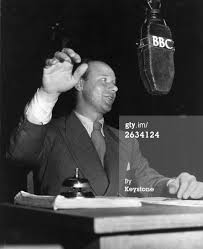
Roy Plumley, BBC
My castaway this week is journalist and broadcaster, Jack Telford. Jack, how much does music matter to you?
Jack Telford

There was always music in the house when I was growing up. It was just after the Great War, of course. My father had died. And I imagine that music was my mother’s way of holding on to his memory. There was an old wind-up phonograph – a Victor, I think – and mother would have me crank the handle while she listened to my dead father’s favourites. These were records like Alexander’s Ragtime Band. Lots of Irving Berlin, now I come to think about it. But music has been one of my passions ever since.
Roy Plumley, BBC
Perhaps we could have your first record?
Jack Telford
Oh, a good marching song to start, I think. It’s a Long Way to Tipperary, please.
Record played
Roy Plumley, BBC
That was John McCormack’s 1914 recording. Your father died on the Western Front then?
Jack Telford
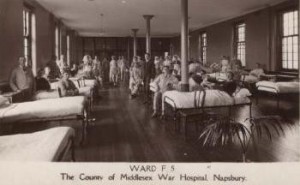
No, I’m afraid not. He died in ‘Fifteen. Hardly a glorious death. A gunner. But he caught a chill, somewhere in Flanders. Complications set in. They sent him back to the Red Cross Hospital at St Albans. He died there. Actually, he killed himself. Couldn’t face the prospect of going back to that senseless butcher’s yard. And his fear of the trenches was so strong that he chose suicide over the slim chance that he might come home intact to his family.
Roy Plumley, BBC
And your second record?
Jack Telford
Something from my college days this time. I was lucky enough to win a scholarship to the Owens College of Manchester University. Strong links to the Mechanics’ Institute. Lots of Left-wing politics. And I ended up editing the college magazine. President of the Esperanto Movement too. And this was our signature tune. When the Red, Red Robin Comes Bob-Bob-Bobbin’ Along.
Record played.
Roy Plumley, BBC
Al Jolson there, of course. Now, Jack, you graduated with a First Class Degree in History, and then went to London University where you studied for a Diploma of Journalism.
Jack Telford
It was the only one available in Britain at the time.
Roy Plumley, BBC
But it took you into Fleet Street.
Jack Telford
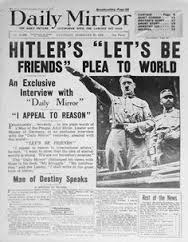
Yes, I started with The Observer, and then went on to work for the Mirror. But I resigned from the Mirror when their anti-appeasement stance veered towards re-armament and a war-mongering editorial line.
Roy Plumley, BBC
You were a committed pacifist by then. And was it your pacifism that took you to Spain?
Jack Telford
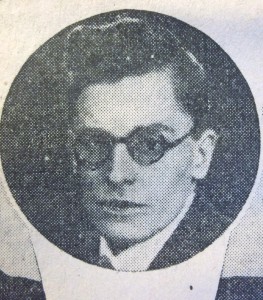
Oh no. That was my new editor, Sydney Elliott. I’d just gone to work for Reynolds News – you may remember that it was the popular Sunday paper of the Co-op at the time. Sydney had been doing a lot to raise money for the people of Spain in their fight against Franco’s fascists. The Civil War was still raging, still in the balance. And then Sydney saw this bizarre brochure in a local Thomas Cook window, he had brought it into the office. Organised tours to Franco’s battlefields. So he sent me on one of them to cover the story.
Roy Plumley, BBC
Astonishing. And your third piece of music?
Jack Telford
It has to be something Spanish, doesn’t it? And nothing reminds me of my time in Spain more than ¡Ay, Carmela!
Record played.
Roy Plumley, BBC
The opening verses of the traditional song ¡Ay, Carmela! – a 1937 recording by Voces Asturianas. But it was thought that you had died in Spain too, Jack. There was an accident, was there not?
Jack Telford
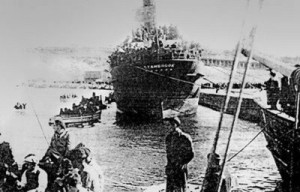
Yes. An accident. Swimming accident. Then a few months with a group of Republican guerrilla fighters, carrying on the fight against Franco’s fascists even when the war itself had basically been lost. I owed them something. We had scores to settle. A spell in Madrid, while the Republic fell apart around us. Then east to Alicante for the final tragedy of the war. I ended up in Oran and was still there when France fell to the Germans. So I joined the Free French. Eventually, General de Gaulle’s people found out that I was a correspondent and I became part of his press corps, with specific responsibility for liaison with the BBC. I was mainly attached to Leclerc’s Division.
Roy Plumley, BBC
Was that difficult?
Jack Telford
The toughest job of my life. But at least the Corporation must have appreciated me, even if de Gaulle did not.
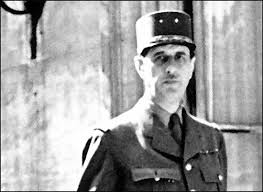
Roy Plumley, BBC
And record number four?
Jack Telford
Josephine Baker, please. Singing J’Ai Deux Amours, of course.
Record played.
Roy Plumley
Those were the closing verses of J’Ai Deux Amours, sung by Josephine Baker. And you, Jack – the two great loves in your own life?
Jack Telford
Perhaps a story for another day.
Roy Plumley
Now, Jack, cast away on your desert island, would you try to escape?
Jack Telford
Definitely. I seem to have spent my whole life escaping from something or other. I joined the Corporation’s European Service in 1943. Spanish Section, to start with. Later, the German Service. I had a couple of months here in ’44, renewed some old acquaintances but London brought back too many old memories. In any case, I ended up being shipped off to Normandy with Leclerc. A long while before I came home.
Roy Plumley, BBC

You covered the Berlin Blockade and the Air-Lift in 1948?
Jack Telford
And the death of Stalin in ’53. The Suez Crisis in ’56.
Roy Plumley, BBC
Record number five, please, Jack.
Jack Telford
Something from the ’Fifties, then. Fats Domino and Blueberry Hill.
Record played.
Roy Plumley, BBC
Fats Domino and Blueberry Hill. Now, you spoke about Sydney Elliott earlier. But you were both reunited in the ’Sixties?
Jack Telford
We hadn’t seen much of each other for thirty years. And I can’t blame him. I gave him some sleepless nights when I disappeared in Spain, I think. But out of the blue he called me. He’d long since moved on from Reynold’s News. Gone over to the other side – Granada Television – working on World in Action. He needed a researcher, and I joined him. I’ve been with the team ever since.
Roy Plumley, BBC
Your sixth choice of music?
Jack Telford
What else could I have for the ’Sixties and ‘Seventies. I was in Lisbon by then. Looking forward to a quiet retirement. But then two things happened. My very good friend, Allan Lawrence, died there. And, almost the same day, the Portuguese Revolution began. The Carnation Revolution, you remember. Well, it has to either be Ella Fitzgerald or Zeca Afonso, I suppose. For Allan, I choose Zeca and Grándola, Vila Morena.
Record played.
Roy Plumley, BBC
Zeca Afonso and Grándola, Vila Morena. And yes, I think everybody remembers your very moving broadcast from Lisbon on the morning of the Revolution, Jack. But now that you’ve retired, do you have any plans?
Jack Telford
I’ll be writing my memoirs, of course. It seems the proper thing to do. The Right-wing in power again. Time to remind people how easy it is for fascism to spread.
Roy Plumley, BBC
And will we finally find out what really happened to you in Spain?
Jack Telford
Perhaps. We’ll have to see, won’t we?
Roy Plumley, BBC
Record number seven, then?
Jack Telford
Given the election result, I can’t think of anything more appropriate than Jake Thackray and The Bull.
Record played.
Roy Plumley, BBC
Jack Telford, you will be given a copy of The Complete Works of Shakespeare to take with you to your desert island. And you can also take either the Bible or another appropriate philosophical work.
Jack Telford
Well, that’s a difficult one. I’ll take Jacob Bronowski’s The Ascent of Man, if I may?
Roy Plumley, BBC
Of course. And one other book?
Jack Telford
My constant companion during that trip to Spain in ’38 was Tolkien’s The Hobbit. It hadn’t been published long but I lost that copy while I was there. I’d like to read it again, I think.
Roy Plumley, BBC
And one luxury?
Jack Telford
A typewriter, please. Lots of paper too, if I may?
Roy Plumley, BBC
I’m sure that can be arranged. Now, your final choice of music?
Jack Telford
My favourite. From La Bohème. O Soave Fanciulla.
Record played.
Closing comments and theme music.
(Readers will know, I’m sure, that Jack Telford is a fictional character and it therefore follows that this transcript is also a work of fiction. Naturally!)
Is it the end of jack? Or is there going to be a jack Telford tour, it would be great, 👍
No, Fran. No Jack Telford tour but another batch of Jack Telford stories coming up – probably in 2025. All Jack’s misadventures from the end of World War Two right through to that edition of Desert Island Discs in 1979. Jack in post-war Berlin, on the sidelines of the Suez Crisis, in Hamburg with the Beatles, in revolutionary Portugal and back in Spain after Franco’s death. Watch this space.